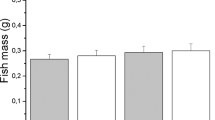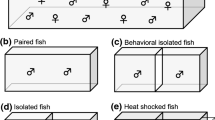Abstract
Low temperature is one of the most common abiotic stresses for aquatic ectotherms. Ambient low temperatures reduce the metabolic rate of teleosts, therefore, teleosts have developed strategies to modulate their physiological status for energy saving in response to cold stress, including behaviors, circulatory system, respiratory function, and metabolic adjustments. Many teleosts are social animals and they can live in large schools to serve a variety of functions, including predator avoidance, foraging efficiency, and reproduction. However, the impacts of acute cold stress on social behaviors of fish remain unclear. In the present study, we test the hypothesis that zebrafish alter their social behaviors for energy saving as a strategy in response to acute cold stress. We found that acute cold stress increased shoaling behavior that reflected a save-energy strategy for fish to forage and escape from the predators under cold stress. The aggressive levels measured by fighting behavior tests and mirror fighting tests were reduced by cold treatment. In addition, we also found that acute cold stress impaired the learning ability but did not affect memory. Our findings provided evidence that acute cold stress alters the social behaviors of aquatic ectotherms for energy saving; knowledge of their responses to cold is essential for their conservation and management.






Similar content being viewed by others
Data availability
Not applicable.
References
Abrahams MV, Colgan PW (1987) Fish schools and their hydrodynamic function: A reanalysis. Environ Biol Fishes 20:79–80
Babkiewicz E, Surga K, Gliwicz ZM et al (2021) The effect of temperature on the spatial learning rate of zebrafish (Danio rerio). Ethol 127:632–642
Barki A, Cnaani A, Biran J (2022) How does temperature affect aggression during and after dominance hierarchy formation in Nile tilapia? Appl Anim Behav Sci 247:105563
Bartolini T, Butail S, Porfiri M (2015) Temperature influences sociality and activity of freshwater fish. Environ Biol Fishes 98:825–832
Barton BA (2002) Stress in fishes: A diversity of responses with particular reference to changes in circulating corticosteroids. Integr Comp Biol 42:517–525
Brandão ML, Colognesi G, Bolognesi MC et al (2018) Water temperature affects aggressive interactions in a Neotropical cichlid fish. Neotrop Ichthyol 16:e170081
Cachat J, Stewart A, Grossman L et al (2010) Measuring behavioral and endocrine responses to novelty stress in adult zebrafish. Nat Protoc 11:1786–1799
Cheryl C, Beitinger TL (2005) Temperature tolerances of wild-type and red transgenic zebra danios. Trans Am Fish 134:1431–1437
Chou MY, Hsiao CD, Chen SC et al (2008) Effects of hypothermia on gene expression in zebrafish gills: upregulation in differentiation and function of ionocytes as compensatory responses. J Exp Biol 19:3077–3084
Chou MY, Amo R, Kinoshita M et al (2016) Social conflict resolution regulated by two dorsal habenular subregions in zebrafish. Science 352:87–90
Colchen T, Teletchea F, Fontaine P et al (2017) Temperature modifies activity, inter-individual relationships and group structure in a fish. Curr Zool 63:175–183
Deng W, Sun J, Chang ZG et al (2020) Energy response and fatty acid metabolism in Onychostoma macrolepis exposed to low-temperature stress. J Therm Biol 94:102725
Domes G, Heinrichs M, Rimmele U et al (2004) Acute stress impairs recognition for positive words–association with stress-induced cortisol secretion. Stress 3:173–181
Fu CW, Horng JL, Tong SK et al (2021) Exposure to silver impairs learning and social behaviors in adult zebrafish. J Hazard Mater 5:124031
Golovanov VK (2006) The ecological and evolutionary aspects of thermoregulation behavior on fish. J Ichthyol 46:S180–S187
Grunwald DJ, Eisen JS (2002) Headwaters of the zebrafish–emergence of a new model vertebrate. Nat Rev 3:717–724
Herskin J, Steffensen JF (1998) Energy savings in sea bass swimming in a school: measurements of tail beat frequency and oxygen consumption at different swimming speeds. J Fish Biol 53:366–376
Hsieh HJ, Hsien YL, Jeng MS et al (2008) Tropical fishes killed by the cold. Coral Reefs 27:599
Hsu TH, Gwo JC (2017) Fine-scale genetic structure of rabbitfish, Siganus fuscescens, in Penghu Archipelago following a mass mortality event caused by extreme cold winter weather. Genes Genom 39:645–652
Johnston IA, Johnson TP, Battram JC (1991) Low temperature limits burst swimming performance in antarctic fish. Biol Antarct Fish, pp 179–190
Kleerekoper H, Timms AM, Westlake GF et al (1970) An analysis of locomotor behaviour of goldfish (Carassius auratus). Anim Behav 18:317–330
Kua ZX, Hamilton IM, McLaughlin AL et al (2020) Water warming increases aggression in a tropical fish. Sci Rep 10:20107
Larsen DA, Beckman BR, Dickhoff WW (2001) The effect of low temperature and fasting during the winter on metabolic stores and endocrine physiology (insulin, Insulin-like growth factor-I, and thyroxine) of coho salmon. Gen Comp Endocrinol 123:308–323
Lauer J, Zhou M, Ye S et al (2022) Multi-animal pose estimation, identification and tracking with DeepLabCut. Nat Methods 19:496–504
Lin LY, Horng JL, Cheng CA et al (2022) Sublethal ammonia induces alterations of emotions, cognition, and social behaviors in zebrafish (Danio rerio). Ecotoxicol Environ Saf 244:114058
Liu C, Ding J, Gao X et al (2021) Effects of acute low temperature stress on the hormones and gene expression of glucocorticoid receptor of large yellow croaker Larimichthys crocea. J Therm Biol 99:103018
Madeira D, Narciso L, Cabral HN et al (2013) Influence of temperature in thermal and oxidative stress responses inestuarine fish. Comp Biochem Physiol 166:237–243
Marras S, Killen S, Lindström J et al (2015) Fish swimming in schools save energy regardless of their spatial position. Behav Ecol Sociobiol 69:219–226
McEwen BS, Sapolsky RM (1995) Stress and cognitive function. Curr Opin Neurobiol 5:205–216
Michie LE, Hitchcock JN, Thiem JD et al (2020) The effect of varied dam release mechanisms and storage volume on downstream river thermal regimes. Limnologica 81:125760
Mukherjee I, Bhat A (2023) What drives mixed-species shoaling among wild zebrafish? The roles of predators, food access, abundance of conspecifics and familiarity. Biol Open 12:bio059529
Nonnis S, Angiulli E, Maffioli E et al (2021) Acute environmental temperature variation affects brain protein expression, anxiety and explorative behavior in adult zebrafish. Sci Rep 11:1–21
Park JC, Jeon YJ, Kim JJ et al (2020) Brief stress impairs recognition memory through amygdalar activation in animals with medial prefrontal cortex lesions. Neurosci Lett 14:135245
Pilakouta N, Killen SS, Kristjánsson BK et al (2022) Geothermal stickleback populations prefer cool water despite multigenerational exposure to a warm environment. Ecol Evol 13:e9654
Porter ES, Clow KA, Sandrelli RM et al (2022) Acute and chronic cold exposure differentially affect cardiac control, but not cardiorespiratory function, in resting Atlantic salmon (Salmo salar). Curr Res Physiol 5:158–170
Ruzicka L, Howe DG, Ramachandran S et al (2019) The Zebrafish information network: new support for non-coding genes, richer gene ontology annotations and the alliance of genome resources. Nucleic Acids Res 47:D867–D873
Schmidt K, Starck JM (2010) Developmental plasticity, modularity, and heterochrony during the phylotypic stage of the zebra fish, Danio rerio. J Exp Zool B Mol Dev Evol 314:166–178
Stallings CD, Coleman FC, Christopher C et al (2010) Energy allocation in juveniles of a warm-temperate reef fish. Environ Biol Fish 88:389–398
Sun JL, Liu Q, Zhao LL et al (2019) Potential regulation by miRNAs on glucose metabolism in liver of common carp (Cyprinus carpio) at different temperatures. Comp Biochem Physiol D Genom Proteom 32:100628
Thandiackal R, Lauder G (2023) In-line swimming dynamics revealed by fish interacting with a robotic mechanism. Elife 12:e81392
Thunell V, Gårdmark A, Huss M et al (2022) Optimal energy allocation trade-off driven by size-dependent physiological and demographic responses to warming. Ecol Soc Am 104:e3967
Toni M, Angiulli E, Miccoli G et al (2019) Environmental temperature variation affects brain protein expression and cognitive abilities in adult zebrafish (Danio rerio): A proteomic and behavioural study. J Proteomics 204:103396
Trillmich F, Guenther A (2023) Shifts in energy allocation and reproduction in response to temperature in a small precocial mammal. BMC Zool 8:23
Trushenski J, Schwarz M, Takeuch R et al (2010) Physiological responses of cobia Rachycentron canadum following exposure to low water and air exposure stress challenges. Aquac 307:173–177
Tseng YC, Liu ST, Hu M et al (2014) Brain functioning under acute hypothermic stress supported by dynamic monocarboxylate utilization and transport in ectothermic fish. Front Zool 11:53
Vogel S, Schwabe L (2016) Learning and memory under stress: implications for the classroom. NPJ Sci Learn 1:16011
Vondracek B, Cech JJ, Buddington RK (1988) Growth, growth efficiency, and assimilation efficiency of the Tahoe sucker in cyclic and constant temperature. Environ Biol Fishes 24:151–156
Wang H, Wang Y, Niu M et al (2021) Cold acclimation for enhancing the cold tolerance of zebrafish cells. Front Physiol 12:813451
Wang H, Wang Y, Niu M et al (2022a) Cold acclimation for enhancing the cold tolerance of zebrafish cells. Front Physiol 12:813451
Wang Z, Dong Z, Yang Y et al (2022b) Histology, physiology, and glucose and lipid metabolism of Lateolabrax maculatus under low temperature stress. J Therm Biol 104:103161
Ward AJW, Kent MIA, Webster MM (2020) Social recognition and social attraction in group-living fishes. Front Ecol Evol 8:15
Weihs D (1973) Hydromechanics of fish schooling. Nature 241:290–291
WendelaarBonga SE (1997) The stress response in fish. Physiol Rev 77:591–625
Woodward G, Perkins DM, Brown LE (2010) Climate change and freshwater ecosystems: impacts across multiple levels of organization. Philos Trans R Soc Lond B Biol Sci 365:2093–2106
Xu X, Guo H, Zhang Z et al (2021) Impact of pre-aggressive experience on behavior and physiology of black rockfish (Sebastes schlegelii). Aquac 536:736416
Funding
This work was supported by grants as follows: (1) the grants from the National Science and Technology Council, Taiwan (MOST-111-2313-B-002-001- and MOST-111-2313-B-002-060-MY3) to Dr. Ming-Yi Chou; (2) the grants from Chang Gung Medical research grant, Keelung branch (CMRPG2F0283) and the National Science and Technology Council, Taiwan (MOST-107-2314-B-182-019) to Dr. Kuang-Yung Lee. We thank the Technology Commons, College of Life Science, NTU, for the technical support in our molecular biological experiments. This article was subsidized by NTU. The funding source had no influence in the study design; collection, analysis, or interpretation of the data; or writing of the manuscript.
Author information
Authors and Affiliations
Contributions
Sian-Tai Liu: Formal analysis, Investigation, and Writing—original draft. Chun-Yung Chang: Formal analysis, Investigation, Methodology, and Data curation. Kuang-Yung Lee: Investigation and Funding acquisition. Sok-Keng Tong: Methodology. Han-Liang Huang: Data curation. Hsi Chen: Data curation. Jiun-Lin Horng: Formal analysis, Supervision, and Validation. Ming-Yi Chou: Conceptualization, Formal analysis, Investigation, Supervision, Funding acquisition, Project administration, Validation, Writing—original draft, and Writing—review & editing. All authors contributed critically to the drafts and gave final approval for publication.
Corresponding author
Ethics declarations
Ethical approval
All experimental protocols conducted in this study were thoroughly reviewed and approved by the Animal Care and Use Committees of National Taiwan University (approval no. NTU-110-EL-00122).
Competing interests
The authors declare no competing interests.
Additional information
Publisher's Note
Springer Nature remains neutral with regard to jurisdictional claims in published maps and institutional affiliations.
Rights and permissions
Springer Nature or its licensor (e.g. a society or other partner) holds exclusive rights to this article under a publishing agreement with the author(s) or other rightsholder(s); author self-archiving of the accepted manuscript version of this article is solely governed by the terms of such publishing agreement and applicable law.
About this article
Cite this article
Liu, ST., Chang, CY., Lee, KY. et al. Alternation of social behaviors for zebrafish (Danio rerio) in response to acute cold stress. Fish Physiol Biochem 50, 653–666 (2024). https://doi.org/10.1007/s10695-024-01296-8
Received:
Accepted:
Published:
Issue Date:
DOI: https://doi.org/10.1007/s10695-024-01296-8




